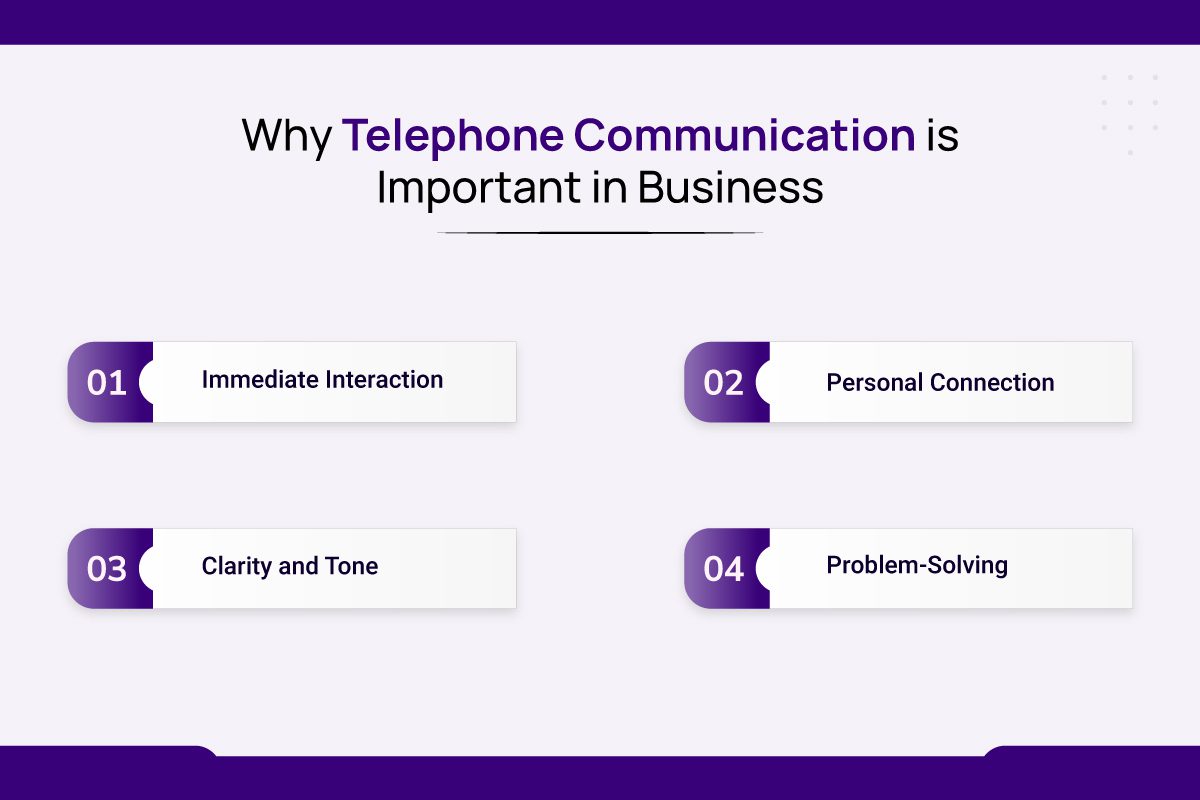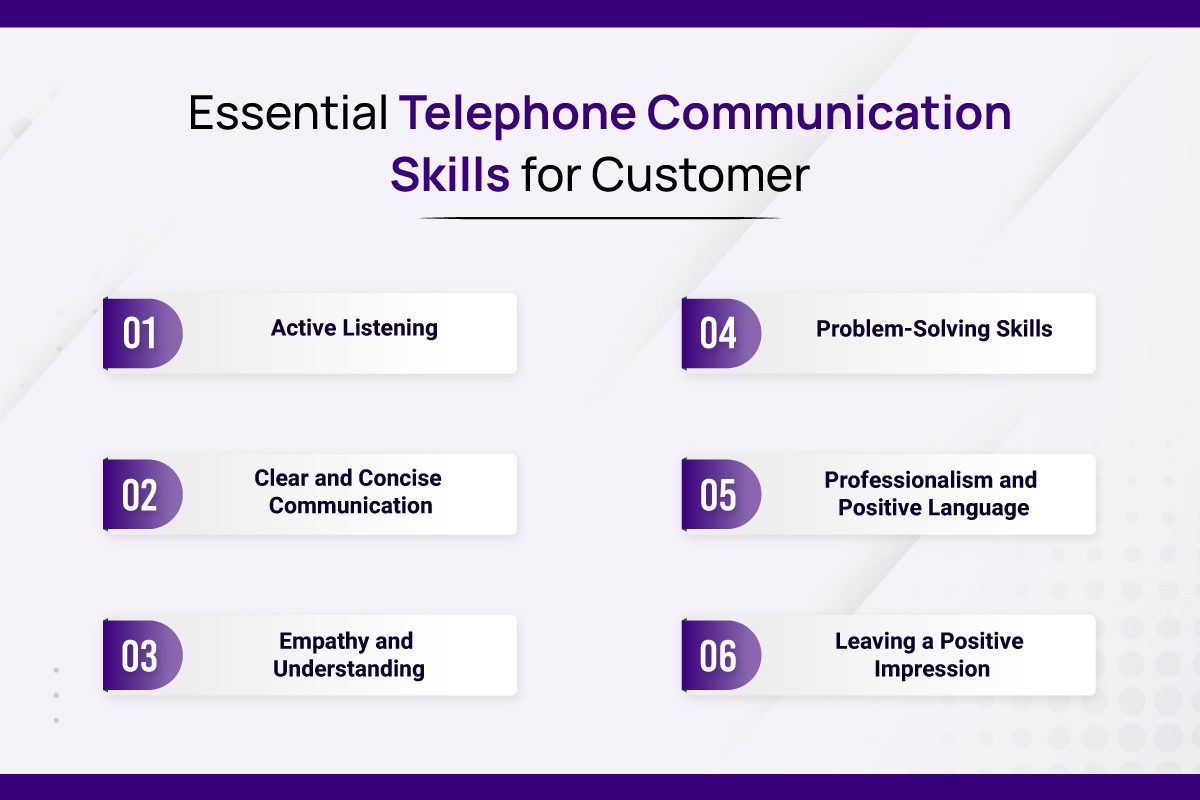
Have you ever thought about what differentiates successful customer service from an unsuccessful one?
Imagine you are on a call with one of the sales reps and trying to figure out some issues regarding a service or product. A study by BenchmarkPortal found that 67% of customers switch brands due to poor customer service experiences. On the other hand, if the sales representative greets you warmly, refers to you by name, and is respectful throughout the entire call, that positive experience can lead to customer satisfaction.
Therefore, it is essential to deliver an empathetic, clear, and professional impression while communicating with the customer. Doing this will help businesses develop a prolonged relationship with the customers and increase their turnover.
So, in this article, we will be exploring the importance of telephone communication in businesses and also some of the essential telephone communication skills required for customer service.
Why Telephone Communication Is Important In Business
Telephone communication is very crucial in businesses to develop meaningful relationships with customers. Likewise, other importance of telephone communication in businesses are:

Immediate Interaction
Immediate interactions in telephone communication offer real-time services, unlike mail or messaging apps, which may delay response. The immediate response function is significant during a situation that requires a prompt response, such as resolving customer queries, locking deals, etc. You can craft various sales pitch ideas which will help you in providing immediate interaction.
Additionally, through immediate interactions, telephone communications help to foster efficiency, which helps in swift decision-making. It also showcases a sense of attentiveness and responsiveness, enhancing customer satisfaction and loyalty.
Personal Connection
Telephone communication is popular for establishing a personal connection between clients and businesses. In telephonic communication, both parties can hear their emotions, tone, and sincerity more clearly. This personal touch helps to build trust and develop rapport that helps to build strong relationships with customers.
Moreover, communication made through the telephone offers a different level of personal touch that is lacking in other communication mediums.
Clarity and Tone
Telephone conversation holds a significant position in businesses due to its ability to convey a level of clarity and tone. The tone of the individuals helps to recognize the level of importance and urgency to resolve any issues they called for.
However, in the case of text messages and emails, the message can be misinterpreted since the reader may not be able to recognize the emotions of the message conveyed. Telephone communications let you listen to vocal cues, intonation, and emphasis that provide a clear understanding of the message.
Problem-Solving
While facing any issues, resolving problems by telephone speeds up the problem-solving process. The conversations on the telephone are immediate, and interactive dialogue helps to improve efficiency at work.
It also provides a space for clarifications, brainstorming, and team collaborations, which indeed find solutions faster. Moreover, the human element in telephone conversation develops empathy and understanding that makes it easier to handle angry customers.
6 Essential Telephone Communication Skills for Customer Service
Some of the essential telephone communication skills for customer service are:

Active Listening
Active listening is one of the basic customer service skills required for sales representatives while making a conversation via telephone. The sales reps must be fully involved in a conversation and try to figure out the underlying emotions and intentions of the customer. This can be recognized through the tone of the voice, choice of words etc.
For active listening, sales professionals must give their entire attention to the customer, discarding the background noises and multitasking. Another important aspect of active listening is acknowledging emotions and expressing compassion.
Active listening also includes asking clarifying questions to make sure you have a complete understanding of customer issues or requests. Moreover, it also includes paraphrasing the customer’s statement to confirm their understanding.
Clear and Concise Communication
Using clear and simple language is the first and foremost aspect of communication. As a sales rep, you need to avoid using technical terms or industrial jargon, which may be difficult for the customer to understand. Along with this, always make sure you are speaking at a moderate pace.
Also, the introductions or information should be broken down into simple steps so that the customer has time to process each piece of information. Another, but the most important thing is you always need to respect customers’ time.
Therefore, get straight to the point, avoiding long details and explanations that will overwhelm and confuse the customer. The focus of the sales rep should be on settling the customers’ issues without changing the path of conversation.
Empathy and Understanding
Empathy and understanding are the most crucial things in communication, and why? Because it helps connect with customers at different levels. Empathy starts with active listening and fully giving attention to understanding peoples’ perspectives. Besides, always respond to the customers’ concerns by acknowledging their emotions, which can be done by the tone of your voice.
Likewise, the sales professionals should always put themself in the shoes of the customers. Perspective-taking would help you understand how you feel about the challenges and frustration faced by the customers.
In addition, you should also be able to normalize the customers’ reaction by assuring them that it is normal to feel in a certain way in given circumstances.
Problem-Solving Skills
Problem-solving skills through a telephone conversation are quite challenging. Customers reach out to the support team regarding any concerns associated with a service or product. It is the responsibility of a sales rep to resolve these concerns amicably.
The sales team needs to ask probing questions to fully get an insight of the nature and scope of the problem.First things first, they need to identify the root cause of the problem which may involve reviewing the previous interactions, consulting with the supervisors, etc.
Likewise, assessing the potential impact of the problem on the customers also helps to define the urgency of the problem. Another important thing that comes under problem-solving skills is finding creative approaches to resolve issues and always staying flexible in the face of challenges.
Professionalism and Positive Language
Professionalism and positive language are important in communication to create a positive image and build trust and rapport. Being professional includes being polite and respectful by addressing the customer with appropriate titles (for example: Mr. or Ms.).
Also, it is equally necessary to maintain a respectful tone throughout the conversation.
All companies have certain guidelines and protocols regarding communication procedures, such as handling sensitive information, which must be followed by a sales rep to maintain standards.
Likewise, the sales rep needs to respect customer confidentiality by safeguarding sensitive information shared during the conversation. Besides, calling through a dedicated second phone number also helps to reflect professionalism. The framework of the language must also be supportive and positive. Instead of saying, “I can’t do this”, say, “Let’s explore other options”.
Leaving a Positive Impression
Leaving a positive impression is the combination of different behaviours displayed while interacting with the customers. It also means leaving a customer with a memorable experience by making the customer feel valued, respected, and satisfied.
Starting a conversation with a warm greeting such as “Hello”, or “Good morning”, etc always helps to create a positive impression. Although in a telephone-based conversation, the customers can’t see your facial expression, it can be recognized by the tone of your voice. Smiling while making a conversation does convey warmth and friendliness.
Along with this, confirmation at the end of the conversation about whether their issue has been solved as per their expectations also leaves a positive impact on customers. Besides, the sales reps can also offer further assistance in the future if any issues are encountered.
Conclusion
Communication is easy, but effective communication through the telephone is rather challenging. Businesses today are doing extensive research to make their telephone interaction a better experience for customers.
Telephone communications are very important since they facilitate immediate interaction, develop a personal connection, define clarity and tone, etc., and hence develop meaningful conversation. However, you will require certain skills to deliver excellent customer interaction. Some of the essential telephone communication skills for customer service are active listening, empathy and understanding, problem-solving skills, professionalism, positive language, etc.
Frequently Asked Questions (FAQs)
- How do you handle an angry customer?
If you ever have to deal with an angry customer over the telephone as a sales rep, at first you need to be calm and listen to their concern. You also need to empathize with their frustrations and offer a sincere apology.
- How can active listening improve customer service over the phone?
By actively listening to customer concerns and by fully understanding their requirements, the businesses can offer more tailored services for the customers. Besides, active listening will make the customers feel valued and also help to build trust, resulting in positive interactions.








